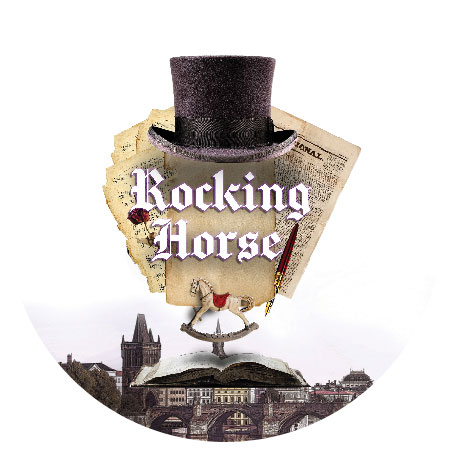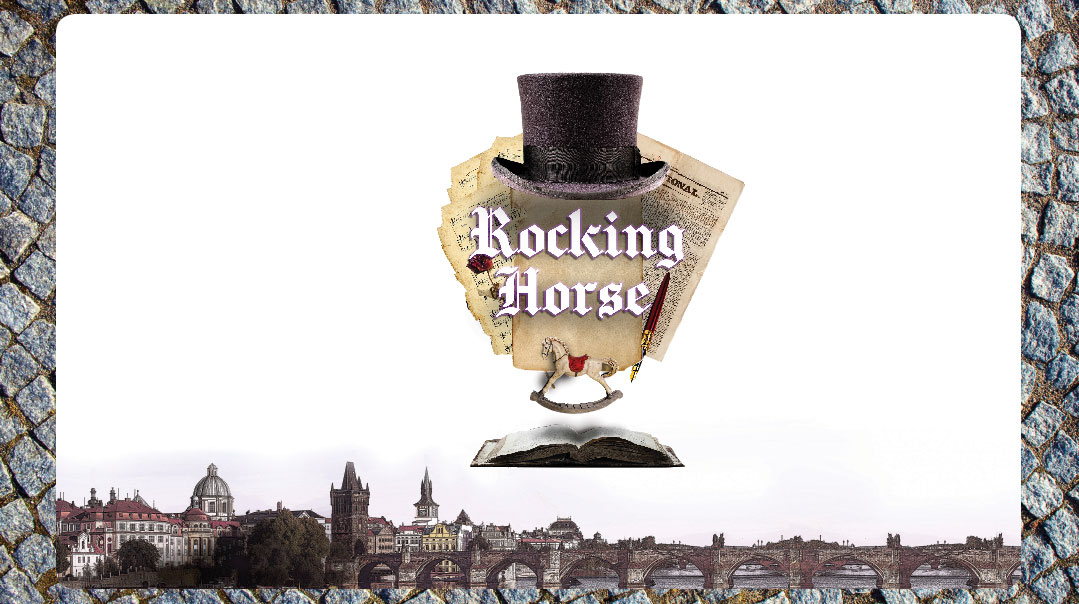Rocking Horse: Chapter 4

“Wherever. They give us their thoughts, but not their bodies. They give us analysis, but not experience.”
"I

f I had a camera,” Felix says, drumming his fingertips on the wooden library desk, “I could simply take photographs of all the books here.”
Wilhelm looks around, smooths his dark moustache with two fingers, and raises a single eyebrow. “And when you have demonstrated your prowess as a photographer, what then?”
“And then I would have no need to sit here, day after day, while my hand cramps from writing notes and my head burns from all these—”
“All the dead words? “
His mother’s son, he can’t quite call the words dead, not while they’re being read and studied. “Not dead words, not exactly.” The shelves climb all the way up to the ceiling, filled with endless volumes. A group of new students sits across the way; Wilhelm doubtless is occupied with deciding what prank he can play on them.
Felix walks over to a shelf and removes an armful of books. Bindings — green, maroon, black. Gold letters embossed on the spine, black ink pressed into the covers. He sets them on the desk with a thump.
“The problem with all these,” he says, “is that they are rectangular.”
Wilhelm leans back in his chair and crosses his long legs. He is amused. “Let me guess. You would rather have triangular books. Or perhaps, perfect circles, a la Leonardo. Or would you prefer that these were inked onto parchment and rolled up, and stacked one upon the other, like in the great library of Rome.”
Felix takes a single book, places it in the middle of the bench.
“It just feels like one shape. One dimension. Just intellect. Just a head, no legs or bodies.”
Wilhelm places a hand on the pile of books, as if to protect them. “All theory and no action?”
“Yes. No. It’s more than theory. It’s a level of being disembodied. These scholars sit in the libraries of Berlin and Paris and Vienna—”
Wilhelm flips open a cover, tugs it toward him and reads the title page. “Athens, actually.”
“Wherever. They give us their thoughts, but not their bodies. They give us analysis, but not experience.”
Wilhelm removes the books from Felix’s hand and gently places it back on the stack. “Well, of course, but whoever said that this is all there is?”
Felix looks at his friend carefully. “What do you mean?”
“Has it ever happened to you that you were thinking about someone, and a few minutes later, you meet him? It could be in an unlikely place, an out-of-the-way bookshop, a coffee shop you never frequent.”
Felix frowns. “If it has happened, then I have not noticed it.”
“Well, start to.” He sniffs. “Or, you are pondering a certain idea, and all of a sudden, it’s mentioned by a professor, a colleague, a student, a sister.”
Felix climbs out of his seat. “That is simply because you are listening out for it.”
“Perhaps. Or perhaps there is something beyond the workings of our rational mind. An energy field that surrounds us, and communicates somehow with others.”
Felix places his hands on Wilhelm’s shoulders. “There is a thin line between all this spiritualism and madness, my friend. Abandon rational thought and you may as well go back to being a Polish peasant.”
Wilhelm shoves his hands off. “I am not denying rationality. I am suggesting that there may be more than that. There is the heart and the mind and there are parts of us that we’re barely aware of.”
Felix puts on his most pompous voice, imitating Professor Handmein. “I fail to follow the intent of your argument.”
Wilhelm’s boots clip on the stone floor as he strides out of the library. “I do not know why you come in here to begin with. It only makes you grumpy.”
“So I should write my dissertation in a coffee shop?”
“A coffee shop? Surely there are more interesting places than that?”
The two wander across the university grounds, and Wilhelm turns to him. “Why are you doing this, anyway? The bachelor’s, obviously. The master’s, I hear. But all the way to the doctorate?”
Felix shrugs. “I’m a Jew. We do things to the end.”
“I fail to …”
“Spare me.” Felix holds up his hand, defending himself.
His mind wanders to home. For the sake of equilibrium, perhaps. Emmy is straining the leashes that bind them to home and heart, so now, it is up to him to balance out her rebellion with obedience. “For my father?”
Wilhelm shakes his head. “Now if it was my father, then your second argument would hold but your first argument would collapse. At present, you have submitted two arguments with as much substances as… as an otherworldly spirit.”
Felix lifts a stone from the ground and throws it. It hits the bark of the tree. “My reputation? My prospects? To impress a future bride?”
“No, no, no.”
“Because I enjoy contemplating the meaning of life?”
“Definitely not. There are far more important things to consider. Such as whether or not man can communicate with souls. Remind me to take you to a séance one of these days.”
A face comes up in his mind. His uncle Shneur, sitting by a volume of the Talmud, singing quietly to himself, peace around him like an aura that could almost be touched. “To make my mother happy?” he says eventually.
“Getting closer,” Wilhelm says. “Keep at it. Perhaps by the time you’ve sprouted your first gray whiskers, you’ll be near to understanding why you’re torturing yourself this way.”
***
The clock on the wall ticks, the hand moves, the small doors fling open, and the cuckoo springs out, and begins calling out the time. Cuckoo, cuckoo.
Hannah looks up at the little bird, bobbing on its piece of wire, and smiles. When they had received it — a wedding gift from Ernst’s fellow violinists — she had been enamored of it, and came running into the living room each hour, in time to see the cuckoo burst out of its little wooden chalet. She had written to Mama, describing it.
Mama had written back, hoping that her daughter was not going to be drawn after frivolities. She had underlined her words in black ink. On the page, Mama had translated the clock into scoopfuls of beans, bags of grain, loaves of bread, hungry families, empty bellies. When she had received the letter, Hannah had been ashamed of herself. So fast had she forgotten her pangs of hunger, for Papa had given away their own bread to the neighbor Guttfried, whose money was all spent on the doctor.
So the clock became a guilty pleasure.
Now, the bird announces that it is 11 o’clock. Felix is at the theater watching his father. Ernst is performing at a special concert tonight —150 years since the passing of Vivaldi — with a program he has been practicing for a month. He won’t be home until after midnight. But Emmy. Emmy had told her of a literary evening. Surely she should be home.
Hannah takes out her Tehillim and retires to her bedroom. In her nightclothes, under the covers, she begins to recite her favorite chapter. “Thos who dwell in the shade of the Almighty…”
Slowly, the words tangle in her tiredness, and then cease. Her hand goes slack, the Tehillim is heavy, and then it falls onto the bedcover. She jerks awake, picks up the volume and places it on her bedtable.
Where is Emmy?
She should say Krias Shema, but she is waiting.
Her eyes close again, a heaviness creeps over her limbs.
From the other room, she hears the clock ticking, the sound of a carriage swishing past in the street. An owl hoots. Silence.
And then, the noise of the front door opening. Hannah blinks. She sits up, pushes slippers onto her feet.
Emmy.
Ah, Emmy, home. Maybe they will have a cup of tea together, Emmy will tell her about the book they read from, or they’ll simply sit in companionable silence.
But there are other voices coming from the kitchen. A clink of glasses. A bottle placed on the table. Wine? Is Emmy drinking wine with her friends?
The shout of laughter. “Hush,” comes Emmy’s voice. The hum of talk. A squeal, a muffled giggle.
Hannah leans forward slightly, listening. Who has Emmy brought home with her? And what are they doing?
The bump of chairs, and all of a sudden, a note on the piano.
Emmy: “Hush, please, you will wake my mother.”
It seems that no one takes notice, for a moment later, the piano is thumping out chords, a melody, a strange song. Nothing that Ernst plays, nothing she would recognize. It must be what Ernst calls a vulgar show tune.
And then there is thumping. Dancing. Hannah bites her lip. Emmy and her friends are in her living room, dancing to some vulgar music, drinking wine, and she is powerless to stop it.
The cuckoo sounds again — 12 calls, midnight, surely Emmy will take note and all will end. But the noise continues on and on, until a carriage clatters to a halt outside, and Emmy bundles her friends out of the house — the door opens and closes, and opens and closes, while Emmy prepares to dutifully greet her father and congratulate him on tonight’s performance, which all the town is saying was a triumph.
The next morning, while Emmy sleeps, Hannah sets the breakfast table for her and Felix. Ernst never eats in the morning, he simply drinks a coffee in the coffeehouse beside the theater, and then overeats at lunch.
For herself, she has a bowl of oat porridge. Felix has toast and marmalade. By the time Felix comes in, and sits down, she has lost patience for niceties about last night’s concert.
“Felix, may I ask you something?”
“Of course, Mama.”
“What do you think of your sister?”
He looks at her steadily, “In what way?”
“I know that this is what is expected of her, of her friends and family and society, but when I see an intelligent and capable young woman doing nothing but worrying about which hat to take to the theater and walking and riding and tea parties, I feel distressed.”
Felix butters a slice of toast. “What would you have her do?”
“When I was her age… I was at the store. Measuring out dried beans and marking down the accounts and making small talk with the customers. It may have been village talk, about the people who died, and those who were ill, and those whose daughter was in shidduchim. It wasn’t about books or poetry or philosophy. But all the conversations today — they feel like… like the reflection in a river. Throw in a stone and you’ll see that there’s nothing there.”
Felix throws back his head and roars with laughter. “Is that what you think?”
“There, we always had something to do, whether a good deed or a mischievous one. A woman who had just had a baby, or a lamb to bottlefeed, or the village drunk to follow around and call names at.” She stumbles, unsure of what exactly she is trying to say. “I know… it sounds…”
“Unsophisticated?” Felix offers.
“More than that. Primitive, you may call it. Compared to your book readings and your lectures and your teas and the great discussions that you all have.” She breaks off.
Felix chews slowly. “Go on, Mama.”
She looks at him gratefully. “It’s just that… at the end of each day, I slept well in my bed. And that counts for something.
“I don’t know that Emmy can say that about her life, and I want to give it to her. There are few enough things I’ve been able to give her in life, I’d like her to know something of this. That there is such a thing as a good day’s work and there is such a thing as the peaceful slumber that accompanies it.”
“I am not entirely sure I understand what you want from her, Mama.”
Hannah takes a deep breath. “I would like to her train to become a teacher.”
(Originally featured in Family First, Issue 673)
Oops! We could not locate your form.







